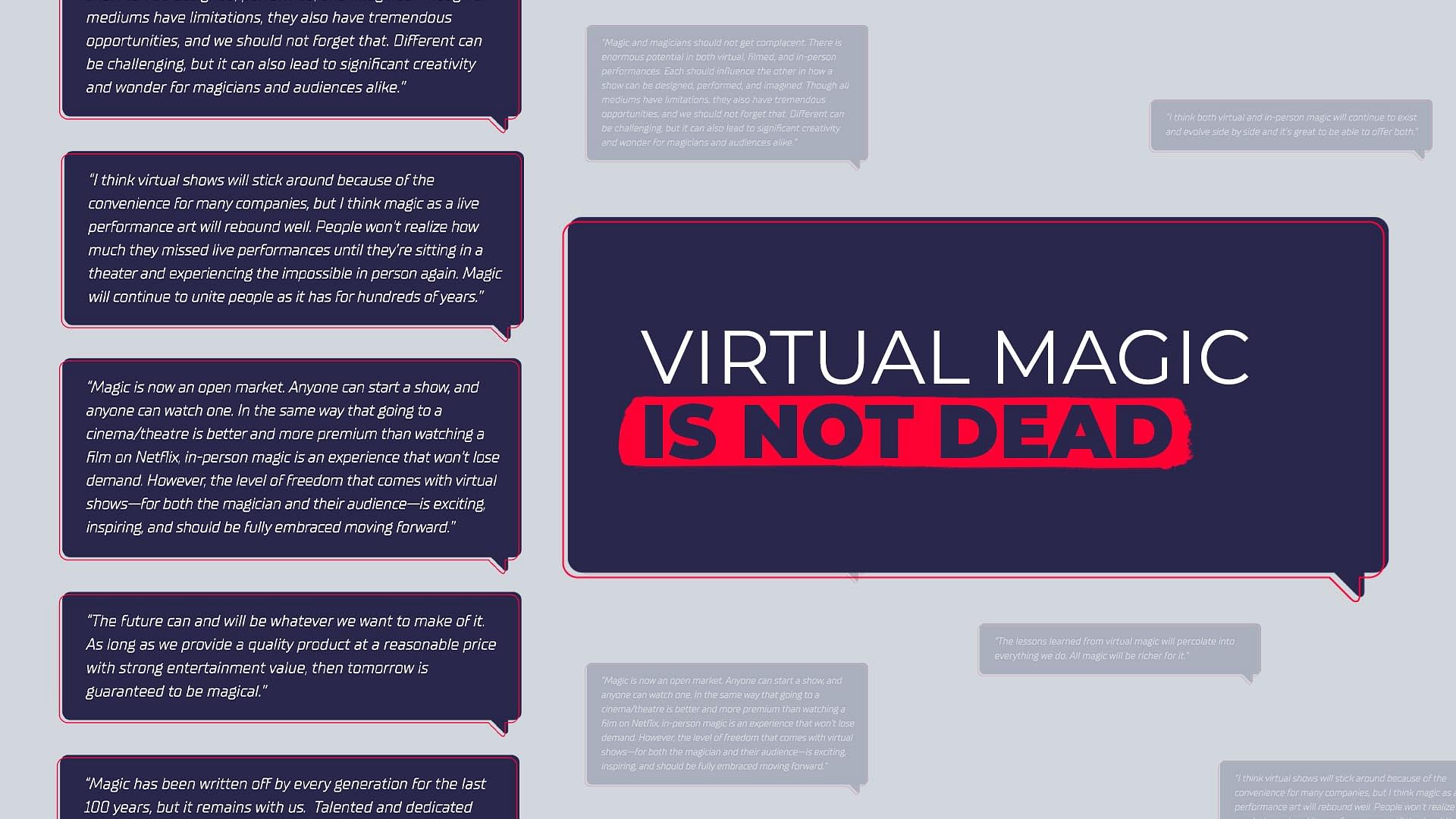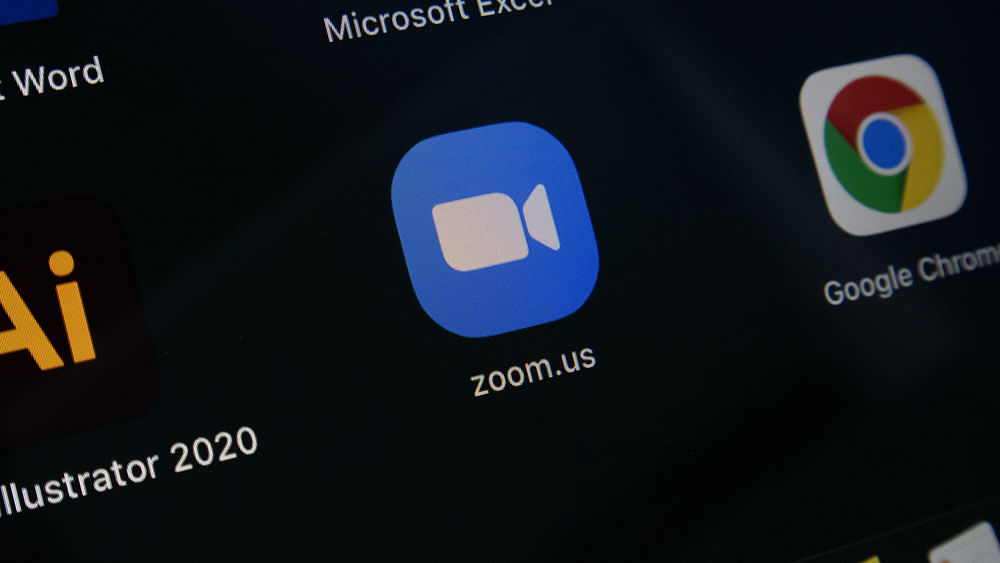Virtual Magic is NOT Dead. It's just Getting Started
While we've already written about the past, present and future of virtual magic, this article on Zoom magic is probably our most controversial. As noted in first article looking back at the past year of virtual magic shows, 20% of magicians in our exclusive "Future Virtual of Magic Survey" still think magic should "only be done in person". Yet, 100s of magicians recently joined us for "Connected: Live" and our new book Video Chat Magic has completely sold out twice.
It's clear that, while virtual magic might not be everyone's cup of tea, there are many magicians that are excited about the opportunities it offers, despite the initial investment and cost. Combined with the future potential of hybrid shows, it's hard to believe that virtual magic is dead. In fact, we think it's just getting started.

Virtual Events Are No Longer a Temporary Fix
While the return of in-person shows is exciting news for live entertainers, it does not mean that virtual events will automatically cease to exist. As noted in a recent trends article from events & management research firm CVENT, many event planners have learned that, when executed effectively, virtual events are way more than just a "pandemic placeholder." While the early stages of virtual events focused on finding ways to convert an in-person event into an online event, decision-makers now have a year’s worth of data to support the value of creating a truly digital-first event.
In fact, The 614 Group found that 71% of media and marketing executives foresee virtual events being the norm in 2021. The AMEX Meetings & Events survey also learned that corporate budgets are estimated to decrease 3.7% globally in the next year and off-site activities are likely to be one of the first things that are cut.
Over the last year, the virtual space has evolved into its own distinct venue with immense potential. Virtual events have a significantly larger reach than traditional in-person events without any of the travel expenses or other complicated on-site logistics. For example, making the Sundance Film Festival a hybrid event could open up the experience to nearly anyone in the world, without having to make any drastic changes to the in-person experience or putting additional strain on the local hospitality industry.
Any magician that has performed a virtual magic show has probably already experienced this on a smaller scale because, for many of them, virtual magic is quite likely the first time they’ve performed for someone outside of their surrounding area. As fans of magic, we also benefit because online magic shows and lectures like Vanishing Inc. Showtime or Vanishing Inc. Masterclass were probably the first time many of you had a chance to interact live with world-renowned magicians like Justin Willman, Lucy Darling, David Williamson and Daniel Garcia.
As one of the magician respondents to our "Future of Virtual Magic Survey" put it:
“Virtual magic has allowed me to expand my potential client base and offerings. I no longer am just a magician. I'm a corporate trainer, a motivational speaker, and a storyteller.”
Where Do Virtual Shows Go From Here?
All this being said, it’s extremely unlikely that digital events will completely replace in-person events. While countless magicians have proven it’s very possible to make strong connections with audiences through a screen, face-to-face interactions are still such a huge part of relationship building. Instead of being an “either/or” situation, it’s best to think of virtual events as a separate space that will continue to thrive independent of in-person events.
Lauren O’Brien, COO of VentureBeat and VB Transform, believes that in-person events will ultimately increase in status and demand, and their topics will evolve as well. In the corporate world, for example, a global survey by consulting firm Oliver Wyman found that 43% of business travelers are expected to travel less in a post-pandemic world. As a result, it’s likely that in-person events will be reserved for executives, and other small events will be done virtually.
It’s not far-fetched to think that the same will be true in the private-party market where Bar/Bat Mitzvahs, for example, will continue to be done in-person, while families that live in different states (or countries) might choose to get together virtually for other special occasions like birthdays, retirement parties or even just regular hangouts.
Simply put, there is no doubt that many people (magicians included) are eager to get back to in-person events, as seen by the 45% of respondents to the “Future of Virtual Magic” survey that claimed, “If I can offer both options, I'll encourage clients to book an in-person show over a virtual show”. Only 19% of respondents said “even with in-person shows returning, I'm going to continue to encourage clients to book virtual shows for the foreseeable future” and just 13% said, “I'm planning to be mostly virtual for the remainder of 2021 and will only do in-person shows in rare circumstances”.
However, it’s also clear that virtual events are not going to vanish (pun somewhat intended) anytime soon—if ever. This probably isn’t very shocking to the 49% of “Future of Virtual Magic” respondents that believed they would still be performing virtual events in 2022, or the 52% that feel clients will still be interested in virtual shows beyond 2021.

Just Because We Can, Doesn't Mean Should
As CVENT put it, the idea of “Why” will permeate 2021 and beyond. Instead of asking “CAN we meet in person?”, after a year of successful virtual and hybrid events, many people might start asking “WHY do we need to meet in person?”
As magicians, we simply cannot expect every corporate event planner and family to blindly return to in-person events as soon as it's safe to do so. More than likely, many of them will now heavily consider if, after factoring in things such as increased budgets (30% of magicians claim they’ll charge a higher rate or “premium” for in-person shows at first) or complex venue arrangements (47% of magicians claim they will “add specific requirements to [their] contract regarding health and safety protocols), is an in-person event actually more beneficial than its virtual alternative?
Paul Draper, an accomplished virtual magician with 100s of shows under his belt, adds:
“Video conferencing tools are not new. They’ve been around for 20+ years. What’s new is the potential we’ve learned they hold. An entire generation of children and young professionals have learned how to live online and embrace video calls as a normal part of everyday life.”
To put it in further perspective, Draper compared this period of time to one of his earliest jobs selling websites to small businesses. He distinctly recalls many organizations telling him that their Yellow Pages listings were working fine and they weren’t buying into this new “fad” called the internet.
Virtual magic is not only not dead, but it’s quite possible that we’ve only scratched the surface of a truly revolutionary moment in the history of our art.
